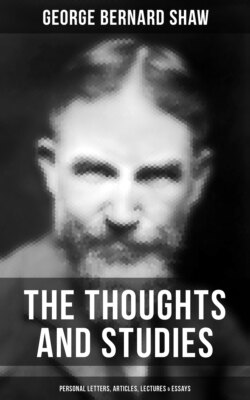Читать книгу The Thoughts and Studies of G. Bernard Shaw: Personal Letters, Articles, Lectures & Essays - George Bernard Shaw - Страница 27
На сайте Литреса книга снята с продажи.
THE LAST FOUR PLAYS
DOWN AMONG THE DEAD MEN
ОглавлениеTable of Contents
Ibsen now lays down the completed task of warning the world against its idols and anti-idols, and passes into the shadow of death, or rather into the splendor of his sunset glory; for his magic is extraordinarily potent in these four plays, and his purpose more powerful. And yet the shadow of death is here; for all four, except Little Eyolf, are tragedies of the dead, deserted and mocked by the young who are still full of life. The Master Builder is a dead man before the curtain rises: the breaking of his body to pieces in the last act by its fall from the tower is rather the impatient destruction of a ghost of whose delirious whisperings Nature is tired than of one who still counts among the living. Borkman and the two women, his wife and her sister, are not merely dead: they are buried; and the creatures we hear and see are only their spirits in torment. “Never dream of life again,” says Mrs. Borkman to her husband: “lie quiet where you are.” And the last play of all is frankly called When We Dead Awaken. Here the quintessence of Ibsenism reaches its final distillation; morality and reformation give place to mortality and resurrection; and the next event is the death of Ibsen himself: he, too, creeping ghost-like through the blackening mental darkness until he reaches his actual grave, and can no longer make Europe cry with pity by sitting at a copybook, like a child, trying to learn again how to write, only to find that divine power gone for ever from his dead hand. He, the crustiest, grimmest hero since Beethoven, could not die like him, shaking his fist at the thunder and alive to the last: he must follow the path he had traced for Solness and Borkman, and survive himself. But as these two were dreamers to the last, and never so luminous in their dreams as when they could no longer put the least of them into action; so we may believe that when Ibsen could no longer remember the alphabet, or use a dictionary, his soul may have been fuller than ever before of the unspeakable. Do not snivel, reader, over the contrast he himself drew between the man who was once the greatest writer in the world, and the child of seventy-six trying to begin again at pothooks and hangers. Depend on it, whilst there was anything left of him at all there was enough of his iron humor to grin as widely as the skeleton with the hourglass who was touching him on the shoulder.
